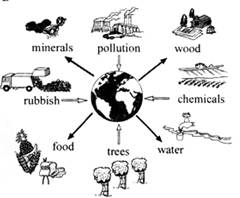
��Ŀ�� ��(l��i)Դ�� �}�ͣ�
�鿴�𰸺ͽ���>>
��Ŀ�� ��(l��i)Դ�� �}�ͣ�
�鿴�𰸺ͽ���>>
��Ŀ�� ��(l��i)Դ�� �}�ͣ�
| A��They | B��Them | C��Their | D��Theirs |
�鿴�𰸺ͽ���>>
��Ŀ�� ��(l��i)Դ�� �}�ͣ�


| A��food | B��rubbish | C��chemicals | D��pollution |
| A��water and grass are polluted | B��plastic and wood become food |
| C��other animals and plants get food | D��metal and glass stay in the ground |
| A��put metal in the ground | B��use more wood |
| C��keep frogs in the water | D��make less rubbish |
�鿴�𰸺ͽ���>>
��Ŀ�� ��(l��i)Դ�� �}�ͣ���x����
| A��work out | B��come across | C��look into | D��pass by |
| A��we should look up new words before reading |
| B��it is sometimes difficult to read a science passage |
| C��the six steps are helpful in learning spoken English |
| D��interesting stories help readers to improve their English |
| A��steps of studying science | B��difficulties in reading science |
| C��ways of reading science passages | D��researches on science and English |
�鿴�𰸺ͽ���>>
��Ŀ�� ��(l��i)Դ�� �}�ͣ���x����
| A��the difference between to two blood types |
| B��the relationship between the two blood types |
| C��the influence of blood type on one��s behavior |
| D��the connection between personality and blood type |
| A��It was lightly believed. | B��It was brought to them. |
| C��They liked and accepted it. | D��They stole the idea from others |
| A��Most scientists in Asia don��t believe in the theory. |
| B��The blood-type theory began in Japan in the 1970s. |
| C��The blood-type personality theory is about blood type. |
| D��People don��t change their personality to match the theory. |
| A��Is the blood-type theory poplar? | B��Is the personality changeable? |
| C��Is it in your blood? | D��Is it in you mind? |
�鿴�𰸺ͽ���>>
��Ŀ�� ��(l��i)Դ�� �}�ͣ�
|
�鿴�𰸺ͽ���>>
��Ŀ�� ��(l��i)Դ�� �}�ͣ���x����
�鿴�𰸺ͽ���>>
��Ŀ�� ��(l��i)Դ�� �}�ͣ�
�鿴�𰸺ͽ���>>
��Ŀ�� ��(l��i)Դ�� �}�ͣ�
| Hi! Liu Jing, My grandpa is going to Beijing next month because he ahs heard a lot about the city and he would like to see it himself. He says the bus service in Beijing is very good now, and people can to anywhere by bus. Is he right? Can you tell me something more about it? I��m looking forward to hearing from you soon. Yours, Tony |
| Hi! Tony, I��m glad to know your grandpa is coming to Beijing. ____________________ ____________________________________________________________________ If you have more questions, please ask me. Yours, Liu Jing |
�鿴�𰸺ͽ���>>
�ٶ����� - ����(x��)��(c��)�б� - ԇ�}�б�
����ʡ��(li��n)�W(w��ng)�`���Ͳ�����Ϣ�e��(b��o)ƽ�_(t��i) | �W(w��ng)���к���Ϣ�e��(b��o)���^(q��) | ����p�_�e��(b��o)���^(q��) | ��vʷ̓�o(w��)���x�к���Ϣ�e��(b��o)���^(q��) | �����֙�(qu��n)�e��(b��o)���^(q��)
�`���Ͳ�����Ϣ�e��(b��o)�Ԓ��027-86699610 �e��(b��o)�]�䣺58377363@163.com